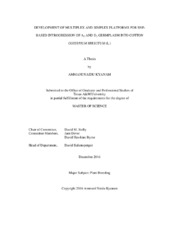| dc.description.abstract | Cultivated Upland cotton, Gossypium hirsutum L., is a partially diploidized allotetraploid species with relatively low levels of genetic diversity. Genetic gain through traditional breeding approaches is thus impeded. The wild species of the primary and secondary gene pools of cotton are approachable sources of agronomic traits of interest, but biological, cytogenetic, genetic and reproductive incompatibilities can impede progress. Genomic markers can alleviate certain difficulties, and expedite selective transfer of exotic species germplasm into one or more elite genotypes of a crop species. Coordinated development of Chromosome Segment Substitution Lines (CSSLs) using markers can in principle lead to complete representation of an alien genome in a cultivated crop.
Co-released with the CottonSNP63K Array, a BeadChip array for high-throughput genotyping of cotton, was a cluster file designed to facilitate automated genotype-calling germplasm from the primary genepool. Reported here is a new cluster file customized to germplasm from diploid species of the secondary gene pool. It significantly improves genotype call frequency and accuracy, and significantly increases the number of usable SNPs.
The first high-density interspecific genetic map of SNPs between cotton and diploid species was developed. It contains 14,411 SNPs, based on segregation in an A2D1-BC1F1 population from an interspecific cross of G. hirsutum and a A2D1 synthetic tetraploid. Genotypes of 72 BC1F1 plants were based on the CottonSNP63K array and the new cluster file. Linkage analysis led to 26 linkage groups corresponding to the 26 chromosomes of cotton.
Utility of the CottonSNP63K Array and its associated SNPs for research and introgression breeding were significantly enhanced by demonstrating the derivation of simplex or low-plex SNP assays. A sample set of SNP mapped markers were validated on the KASP™ based assays and the conversion rate was estimated at 44%. This indicates a potential for development of ad hoc simplex SNP assays that can be applied to large populations for marker-assisted introgression, selection and down-stream breeding. KASP assays are applicable to DNA extracted non-destructively from seed or seedling at low-cost. Thus, validated CottonSNP63K SNPs can be used for targeted purposes, such as detection of rare recombination events or rare combinations of genes. | en |


